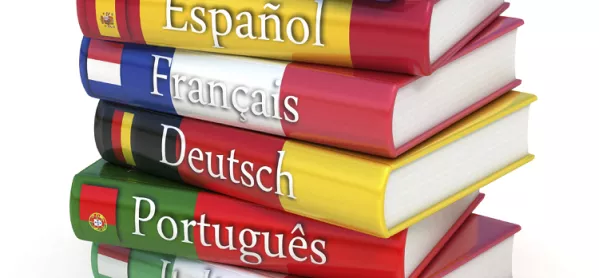The government is “struggling hugely” with entries to GCSE modern foreign languages, and “the situation is getting worse”, a senior Department for Education official has admitted.
Josh Beattie, assistant director of the curriculum division of the DfE, also said he “selfishly” wished that Ofqual had lowered grade standards for French, German and Spanish at A-level to boost entries.
Mr Beattie’s downbeat assessment about the health of language learning contrasts with the more rosy picture presented by the DfE this summer.
He was talking about the English Baccalaureate - which he leads on at the DfE - at an event in London today.
Mr Beattie admitted that EBacc entries had “plateaued”, but highlighted language entries as his greatest area of concern.
“The one that’s really lagging behind, and the one we’re struggling hugely with is languages,” he said.
“Languages have pretty much stagnated, the EBacc hasn’t had much effect.”
Mr Beattie said there had been a “shallow decline” in language entries, “so the situation is getting worse in that respect”.
According to provisional figures published by the DfE last month, EBacc languages dropped by 1.2 percentage points in 2018, with 46.1 per cent of students taking at least one language for GCSE, continuing a falling trend since 2014.
On GCSE results day, the DfE pointed out that nationally exam entries to MFL had increased, with rises in Spanish and German.
While entries fell in French, the DfE insisted they had “remained broadly stable in line with population change”.
However, as Tes reported in September, questions have been raised about whether GCSE language entries in 2018 were inflated by a fall in IGCSE entries.
Mr Beattie said that the “big barriers” language learning faced were that some pupils “don’t think it’s interesting, sometimes they don’t like the teacher, and [think] that it’s too difficult”.
Asked about Ofqual’s decision not to lower grade standards in French, German and Spanish at A-level, he said: “Selfishly, I wish they hadn’t, but if that’s where they’ve come from with the evidence, you can’t just lower the bar.”
He said that the DfE was trying to show that languages “can open up doors and be transformative”.
The department is launching a pilot programme in January that will see university language undergraduates go into schools to mentor Year 9 pupils and encourage them to persevere with a language.
The DfE has also launched a network of language pedagogy hubs.





